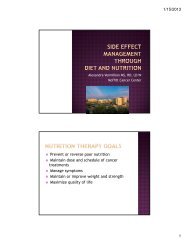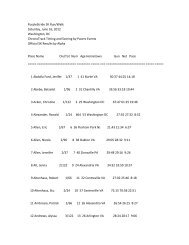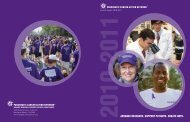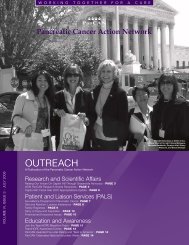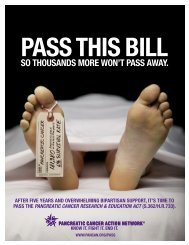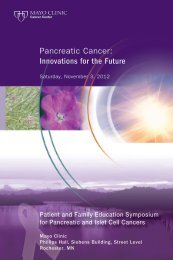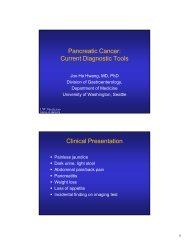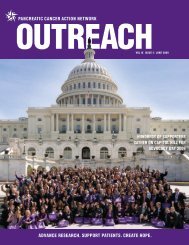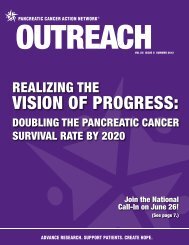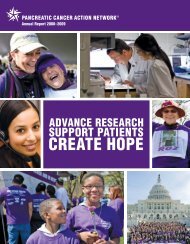outreach - Pancreatic Cancer Action Network
outreach - Pancreatic Cancer Action Network
outreach - Pancreatic Cancer Action Network
Create successful ePaper yourself
Turn your PDF publications into a flip-book with our unique Google optimized e-Paper software.
DOUBLING THE SURVIVAL RATE BY 2020<br />
Look at pancreatic cancer and you’ll see something wrong.<br />
Survival rates have stayed in the single digits for 40 years. Today,<br />
the five-year survival rate remains at just 6 percent. We have a<br />
vision to change that—to double the survival rate by the year<br />
2020. Together, we can know, fight and end pancreatic cancer<br />
and create hope for a greater chance of survival for patients<br />
everywhere.<br />
“We are intensifying our efforts to raise awareness, fund<br />
research, support patients and advocate for a national research<br />
strategy dedicated to finding a cure by undertaking this bold<br />
new initiative,” said Julie Fleshman, President and CEO of the<br />
<strong>Pancreatic</strong> <strong>Cancer</strong> <strong>Action</strong> <strong>Network</strong>. “With the support of our<br />
dedicated constituents, I have no doubt we will make it happen.”<br />
The strategy consists of four components:<br />
Advance Research Discoveries. Medical advances do not<br />
happen through a scattershot approach, so we remain committed<br />
to building a comprehensive and coordinated pancreatic cancer<br />
research community to speed the acquisition of knowledge, share<br />
information and move findings into practice. We will continue to<br />
fund research grants that attract the most talented and promising<br />
young scientists to study the disease and re-engage scientists<br />
already in the field by funding their innovative research projects<br />
and creating a collaborative network for them to share discoveries<br />
with other researchers.<br />
Support Patients and Families. Our efforts to educate patients<br />
and family members about the disease so they can make informed<br />
medical decisions are also critical to making progress. We are<br />
increasing the capacity of our one-on-one patient support through<br />
our Patient and Liaison Services, or PALS, Program. Central to<br />
our aim of doubling the survival rate is intensifying our efforts<br />
to provide the latest and most accurate medical information for<br />
patients, encouraging them to enroll in clinical trials, and directing<br />
them to pancreatic cancer specialists.<br />
Build and Sustain Federal Support. Much progress has been<br />
made against other deadly diseases when privately funded<br />
research has been merged with a dedicated federal research<br />
strategy. At present, the federal government has no long-term,<br />
comprehensive research strategy for pancreatic cancer. It<br />
dedicates little funding to pancreatic cancer research relative to<br />
the other leading cancers. Our advocates will continue to educate<br />
Members of Congress about pancreatic cancer and encourage<br />
them to introduce and pass the <strong>Pancreatic</strong> <strong>Cancer</strong> Research<br />
& Education Act (S.362/ H.R.733), legislation that will spur the<br />
National <strong>Cancer</strong> Institute to develop and fund a long-term,<br />
comprehensive research strategy for developing early diagnostics<br />
and better treatments to increase survival rates.<br />
Mobilize Troops. Through the years, our volunteers and advocates<br />
have significantly heightened national awareness of pancreatic<br />
cancer while raising tens of millions of dollars to fund private<br />
research, directly support patients by providing information<br />
and education, educate those in the federal government about<br />
pancreatic cancer and the need for increased research funding.<br />
We’ll continue to expand our national network by providing people<br />
with the tools they need to educate, organize and empower others<br />
to know, fight and end this devastating disease.<br />
Look for more information in the coming months about our<br />
vision of progress to double the survival rate for pancreatic<br />
cancer patients by 2020.<br />
BOARD MEMBERS APPLAUD NEW 2020 GOAL<br />
When The Vision of Progress: Double the <strong>Pancreatic</strong> <strong>Cancer</strong> Survival Rate by 2020 was shared with the three advisory<br />
boards of the <strong>Pancreatic</strong> <strong>Cancer</strong> <strong>Action</strong> <strong>Network</strong> – the National Board of Directors, the Scientific Advisory Board<br />
and the Medical Advisory Board – the response was overwhelmingly positive. Here, three members convey their<br />
enthusiasm about the initiative and how they believe it will benefit the pancreatic cancer community.<br />
"This is an important and achievable goal and we all share the hope that the survival rate will more than double during this time<br />
period. There are well-known examples of such advances. Regarding childhood cancer, the five-year survival for acute lymphocytic<br />
leukemia was around 10 percent in the 1960s. It increased to approximately 25 percent in children diagnosed between<br />
1970 and 1974. The 30-month survival rate for testicular cancer increased from 22 percent during 1973 to 1976 to 56 percent<br />
during the period from 1977 to 1979. Congratulations on articulating this goal and raising the bar on the pace of progress."<br />
— Margaret Mandelson, PhD, Fred Hutchinson <strong>Cancer</strong> Research Center, Scientific Advisory Board<br />
"Congratulations...your choice to set an objective and quantifiable goal is perfectly appropriate. It will give everyone familiar<br />
with the organization a target and a metric by which to judge not only the progress of the <strong>Pancreatic</strong> <strong>Cancer</strong> <strong>Action</strong> <strong>Network</strong><br />
but the efforts of the entire scientific community as well. There should not be any hesitancy or reluctance to accept the challenge<br />
and set the goal. The benefits and energy derived by setting the goal outweigh any notion of risk if it is not achieved..."<br />
— Mark Talamonti, MD, NorthShore University HealthSystem, Medical Advisory Board<br />
"I think this is outstanding."<br />
— Jordan Berlin, MD, Vanderbilt-Ingram <strong>Cancer</strong> Center, Chair/Medical Advisory Board<br />
4 February 2011 OUTREACH



